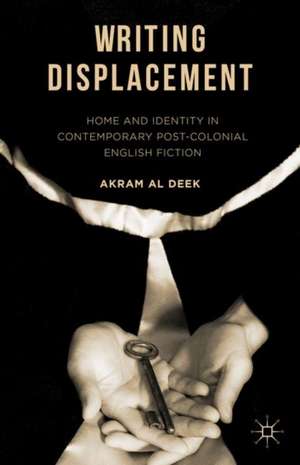Writing Displacement: Home and Identity in Contemporary Post-Colonial English Fiction
Autor Akram Al Deeken Limba Engleză Paperback – 12 sep 2017
Preț: 229.87 lei
Nou
Puncte Express: 345
Preț estimativ în valută:
43.99€ • 47.93$ • 37.06£
43.99€ • 47.93$ • 37.06£
Carte tipărită la comandă
Livrare economică 23 aprilie-07 mai
Preluare comenzi: 021 569.72.76
Specificații
ISBN-13: 9781349953196
ISBN-10: 1349953199
Pagini: 204
Ilustrații: IX, 204 p.
Dimensiuni: 140 x 216 x 22 mm
Greutate: 0.25 kg
Ediția:1st ed. 2016
Editura: Palgrave Macmillan US
Colecția Palgrave Macmillan
Locul publicării:New York, United States
ISBN-10: 1349953199
Pagini: 204
Ilustrații: IX, 204 p.
Dimensiuni: 140 x 216 x 22 mm
Greutate: 0.25 kg
Ediția:1st ed. 2016
Editura: Palgrave Macmillan US
Colecția Palgrave Macmillan
Locul publicării:New York, United States
Cuprins
1. Writing Displacement.- 2. Displacing Cultural Identity.- 3. The Windrush Generation: Remapping England and Its Literature.- 4. Masala Fish: Cultural Synthesis and Literary Adventuring.- 5. Promoting Cultural Diversity/Multiculturalism Post 9/11: A Conclusion.
Notă biografică
Akram Al Deek is an Assistant Professor at the American University of Madaba, Jordan. Al Deek is a Palestinian writer and lecturer in post-colonial studies, world literatures, and cultural and literary theory. Subsequent to his family's exile from Palestine, he was born in Jordan (German by nationality) and spent his entire twenties working and studying in England. Al Deek is currently working on his semi-autobiographical memoir, The Eucalyptus Tree: Episodes of Dispersals.
Textul de pe ultima copertă
This book studies the metamorphosis of the politics of home and identity amongst migrant nationals after WWII, using the Palestinian exilic displacements as a tool to find intersecting points of reference with the Caribbean, Indian, African, Chinese, and Pakistani dispersions. From Sam Selvon to Salman Rushdie and Edward Said to Homi Bhabha, the author here reroutes filiation to affiliation. The text troubles the ideas of citizenship and national belonging; it celebrates the freedom to be 'out of place' which opens doors for and promotes rediscovery of materials that have been repressed or pushed aside in cultural translation, without falling into mental ghettoisation.
Caracteristici
Uses the Palestinian exilic displacements as a tool and compass to find intersecting points of reference with the Caribbean, Indian, African, Chinese, and Pakistani dispersions Studies the metamorphosis of the politics of home and identity amongst different migrant nationals from the end of WWII into the new millennium Celebrates the freedom to be 'out of place' which opens doors for and promotes rediscovery of materials that have been repressed or pushed aside in cultural translation
